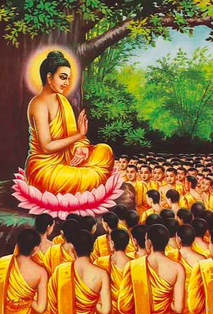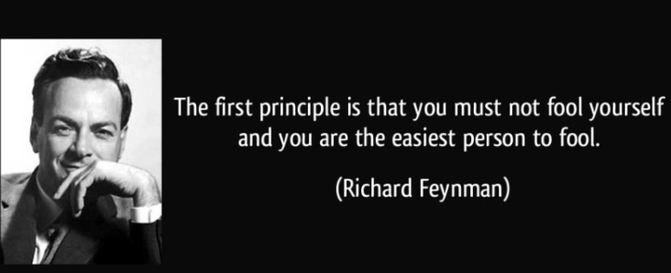 “The Discourse to the Kalamas,” most popularly known as “The Kalama Sutta,” has been called “The buddha’s charter of free inquiry” and “The buddha’s manifesto for critical thinking” and is justly famous – and often repeated in contemporary, western buddhist circles – for its encouragement of free inquiry but is often misrepresented by contemporary practitioners. The Kalamas, inhabitants of Kesaputta, went to where the buddha was staying and said: "There are some monks, brahmans, and teachers who come to Kesamutta. They talk and explain a lot about their own doctrines while cursing, despising, reviling, and pulling to pieces the views and doctrines of others. And after listening to them, we feel doubt and uncertainty about what they say. We wonder which of these reverend monks, brahmans and teachers speak the truth and which are speaking falsehoods?" The criterion for rejection The buddha responded: "It is understandable for you, Kalamas, to doubt and to be uncertain; uncertainty has arisen in you about matters that are wide open to doubt. Come, Kalamas; Do not go upon what has been acquired by repeated hearing; nor upon tradition; nor upon gossip, rumor and unconfirmed reports; nor even upon what is in scripture or asserted by authority; nor upon logical reasoning nor by inferential reasoning; nor by reflection on superficial appearances; nor upon axioms; nor upon specious reasoning; nor upon a bias towards a notion that has been pondered over; nor upon another's seeming ability; nor upon opinions and speculation nor upon the appearance of plausibility; nor upon the consideration, 'This is our teacher who must be deferred to.' Instead, Kalamas, when you yourselves know for yourselves: 'These teachings are detrimental; not good or true and would be censured by the wise; these teachings when put into practice lead to suffering, harm and ill, then, Kalamas, you should reject and abandon them.” ---Kesamutti-Sutta a.k.a. Kalama-Sutta “The Discourse to the Kalamas,” most popularly known as “The Kalama Sutta,” has been called “The buddha’s charter of free inquiry” and “The buddha’s manifesto for critical thinking” and is justly famous – and often repeated in contemporary, western buddhist circles – for its encouragement of free inquiry “exempt from fanaticism, bigotry, dogmatism and intolerance,” as Soma Thera writes. In this discourse to a group of people who were not his students, the buddha presents a strategy for determining what propositions are worthy to embrace and which should be rejected. What is incredibly relevant to our current time is that the advice he gives can and should be extended to the inquiry into any types of dogmatic assertions: religious, scientific, and political. Indeed, when really looked into, the model and strategy the buddha advises could be called “scientific skepticism,” the basis of zen naturalism as I have been ‘creating’ for myself and those who find it more in line with an evidence-based spirituality or religious orientation. One can marvel that a teacher such as the buddha, embedded in a traditional society like ancient India where social and religious dogma was ubiquitous would have had the temerity to assert such a radical, revolutionary idea! But Glenn Wallis, in his most excellent and necessary collection of essential suttas from the Pali Canon simply entitled Basic Teachings of the Buddha, points out that this discourse is even more than that. Indeed, when we consider the inventory the buddha puts forth as inadequate for determining the value of an idea, we recognize how pervasive these practices are! And how often we ourselves indulge in such practices. If we are not to be convinced of a position by unconfirmed reports, by tradition, by hearsay, scripture, rational logic, nor deductive inference, by reflection upon appearances, by opinion and speculation, nor by the appearance of plausibility (common sense) and intuition, and perhaps most especially, by the mere fact that someone is our teacher, we have to ask, ‘What is left?’ First, it might be helpful to understand why we cannot rely on these strategies and the reason may be as simple as that each and every one of them, though they may be true or lead to truth in some situations, are also fallible. Social science tells us, for instance, that even gossip -- something generally frowned upon – can serve communitarian values. But not when it is maliciously reported nor when it is untrue. Inference can lead to new insight, but also to very wrong conclusions. If logic is based upon faulty premises, it may lead to absolute nonsense (All humans are fish. Aristotle is a human. Thus, Aristotle is a fish. This is a logically valid argument but obviously not sound because the premises are false.) Each of the ways the buddha enunciates that are used to assert the truth are fallible in some way or another. In zen we are reminded daily: “Great is the matter of life and death.” So, if we cannot depend upon the strategies outlined by the buddha in this discourse, how do we respond to the existential questions posed by “the great matter?” Glenn Wallis suggest that it might first be a worthwhile exercise to spend some time thinking about the grounds for certain of your views concerning the great matter of life and death. He asks, “Do you assume that the universe has a beginning…or (do you) believe in continued existence after death” whether in some other realm such as heaven or via reincarnation? Are such assumptions and belief grounded in any of the categories listed by the buddha as not ultimately reliable? That is, what is your belief about the cosmos or about life after death rooted in? Tradition? Religious or philosophical doctrine? Scripture? The teaching of some religious authority? And if we are truthful about our response to this question, can we be firmly confident that such belief deserves the kind of loyal adherence that is often extended to religious convictions… to the point of killing and dying for them? I have only shared the first part of the sutta and plan to return to the rest of the discourse where the buddha both offers a tool for deconstructing dogma as well as a positive practice that is not dependent upon tradition, hearsay, authority or any of the other strategies listed by the buddha. But, first I wish to draw attention to something that almost all western contemporary buddhist teachers and practitioners seem to ignore. I can almost guarantee you that if you look up the "Kalama-Sutta" in any contemporary book, there is one line that is elided and that is the mention of the “censure of the wise.” For instance, in The Buddha Speaks, edited by Anne Bancroft, she has: ‘Kalamas, when you know from within yourselves that certain teachings are not good, that when put into practice they lead to loss and suffering, you must then trust yourselves and reject them.’ Note: no mention of the wise who might offer feedback. This tendency to ignore such feedback leads to the danger of subjective relativism. The problem is, no one can fool you as completely as you can yourself or as the physicist Richard Feynman put it:  Which brings me back to the importance of scientific skepticism for any naturalist-based religious or spiritual path such as Zen Naturalism. The buddha gives us “When you know for yourselves” as the basic test criterion for evaluating the worthiness of any teaching presented to us. Now, most religious claims are speculative in nature and thus fail to pass the basic test of being knowable. It was a kind of epistemological integrity that led the zen master Gudo to answer “How should I know” when he was asked by the emperor “What happens to a man of enlightenment after death?” When the emperor then said, “Because you’re a zen master!” Gudo replied, “Yes, but not a dead one.” Let’s be honest and admit that very few religious teachers speak with such humility but rather speak with assurance because it’s their tradition and the scriptures and the authorities say so.
By telling the Kalamas “when you know for yourselves,” the buddha eliminates many of the teachings that the Kalamas find so confusing and contradictory. What can be said is that such speculative teachings can be believed or accepted but never authenticated as accurate, true or even reliable. They are faith-based beliefs. On the other hand, there are teachings and practices that are testable! Like any scientific hypothesis, such teachings are capable of being verified or falsified in one’s own experience. Many of the yogic-meditative teachings of the mendicants who lived and taught outside the Brahmanical culture at the time of this discourse would be included in this category. Wallis writes: “The buddha’s insistence on empirically testable data forces a displacement of authority. When a testable claim is posited, the arbiter of value is no longer tradition or scripture, or even sophisticated mental operations such as inference and deduction.” Taking the buddha seriously means testing the teachings against your own situation and experience. AND, once again, looking to see if there is a consensus. Science works by repeated testing by many different individuals until some consensus is arrived at. For instance, testing the hypothesis that climate change is leading to increased global temperature based upon one’s local situation in the Northeast of the United States this past winter would seem to fail because it was a punishingly cold winter. But through more global, repeated study and analysis, it would be foolish to come to reject the consensus that climate change is real just because you had a cold winter where you live. So, perhaps we can look at our preciously held beliefs and assumptions to see which can be verified via empirical research and which must be either jettisoned or accepted as assertions of faith and speculation. If that can be agreed upon, much acrimony could be avoided.
2 Comments
8/31/2018 02:14:05 pm
Frank, I need to think about this for a bit. To denigrate, as Buddha does, "logical reasoning" and "inferential reasoning' seems to take away the tools by which "the wise" are able to reach consensus.
Reply
8/31/2018 05:12:05 pm
Jefferson,
Reply
Leave a Reply. |
AuthorPoepsa Frank Jude Boccio is a yoga teacher and zen buddhist dharma teacher living in Tucson, AZ. Categories |
 RSS Feed
RSS Feed